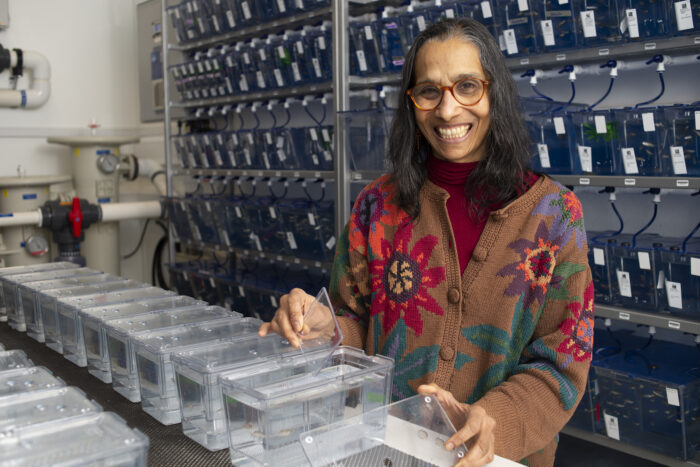
Lalita Ramakrishnan, Group Leader in the LMB’s Cell Biology Division and the University of Cambridge’s Molecular Immunity Unit (housed in the LMB), has been announced as the 2024 recipient of the Robert Koch Prize, in recognition of her pioneering research investigating the molecular mechanisms behind tuberculosis (TB).
The Robert Koch Award is awarded annually to recognise outstanding researchers for their internationally acclaimed scientific accomplishments. Supported by the German Federal Ministry of Health, the award is one of the most prestigious scientific prizes in Germany and dates back to 1960.
Lalita’s research into TB has huge global importance given that the disease continues to be a major cause of death in many countries, despite the effective prevention and treatment options provided by vaccines and antibiotics. Lalita’s group uses the zebrafish as a model to study how mycobacteria cause disease, as the fish are a natural host to Mycobacterium marinum, a close relative of the human TB bacterium. Importantly, the zebrafish is genetically tractable and optically transparent, making them an ideal model to manipulate and monitor infection in real time.
Lalita’s recent research findings include elucidation of the pathway behind the mechanism of TB infection, how the mTOR kinase acts as an early host resistance factor against TB, and how commonly used drugs, including heartburn drugs could be used to improve TB therapy.
Lalita began her research career by completing medical training in India, before moving to the US to complete a Ph.D. in Immunology and medical residency training at Tufts Medical School in Boston. Following this, she went on to a clinical Infectious Diseases Fellowship at the University of California, San Francisco, and then a postdoctoral fellowship at Stanford University where she began her TB studies. In 2001, Lalita joined the University of Washington, where she pioneered using zebrafish to model TB pathogenesis.
She moved to Cambridge in 2014, where alongside her roles at the LMB, and the Molecular Immunity Unit, she also serves as Professor of Immunology and Infectious Diseases in the University of Cambridge’s Department of Medicine, a Principal Research Fellow at the Wellcome Trust, and an Infectious Diseases Consultant at Cambridge University Hospital. Lalita is a member of the US National Academy of Sciences, a Fellow of the Royal Society, the Academy of Medical Sciences, EMBO, and the American Academy of Microbiology. She was recently awarded the Gardner Middlebrook Lifetime Achievement Award in Mycobacterial Research
Lalita will receive the Robert Koch Prize at an awards ceremony on 8th November 2024 in Berlin.
Further references
Lalita’s group page
Robert Koch Foundation press release
Lalita Ramakrishnan joins the LMB Cell Biology Division